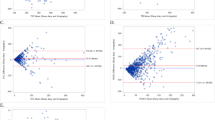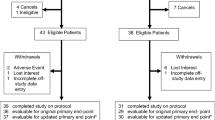Abstract
Context
A knowledge gap exists in our understanding of the illness and insomnia symptom treatment trajectory in adults with inoperable non-small cell lung cancer (NSCLC).
Objectives
Compare valid and reliable sleep-wake measures for insomnia to interpretations of narrative descriptions of sleep to improve our comprehension of sleep-wake disturbances in adults with NSCLC.
Methods
This study employed mixed methods (quantitative and qualitative) in a longitudinal design to study adults (n = 26) from ambulatory thoracic clinics. Valid and reliable surveys (Pittsburgh Sleep Quality Index, Epworth Sleepiness Scale), 7-day sleep diary, and actigraphy were obtained with interview narrative interpretations of sleep experiences in the context of lung cancer. Data collection occurred at four-time points: baseline (before chemotherapy), pre-second chemotherapy, pre-third chemotherapy, and 6 months from baseline. Sleep measures were compared to interpretations from interview narratives to understand context of survey measures.
Results
Objective quantitative results were congruent with interview narrative interpretations that reflected participants’ sleep-wake experiences. Objective sleep-wake measures for insomnia over-time described increasing sleep latency and decreasing sleep duration. The interview narratives provided context and insight into participants’ subjective insomnia experiences. While participants’ insomnia symptoms were present, they were resigned to endure insomnia, and the subjective measures reflected a more positive perception of sleep outcomes.
Conclusion
A mixed methods approach provides a deeper understanding of sleep-wake disturbances and the differing quantitative objective and subjective results of sleep measures in the context of the participants’ experience of the trajectory of insomnia symptoms before, during, and after lung cancer treatment.
Similar content being viewed by others
References
Siegel RL, Miller KD, Jemal A (2017) Cancer statistics, 2017. CA Cancer J Clin 67(1):7–30
Kanodra NM, Silvestri GA, Tanner NT (2015) Screening and early detection efforts in lung cancer. Cancer 121(9):1347–1356
Carnio S, Di Stefano RF, Novello S (2016) Fatigue in lung cancer patients: symptom burden and management of challenges. Lung Cancer (Auckl) 7:73–82
Silvoniemi M, Vasankari T, Löyttyniemi E, Valtonen M, Salminen E (2016) Symptom assessment for patients with non-small cell lung cancer scheduled for chemotherapy. Anticancer Res 36(8):4123–4128
American Psychiatric Association (2013) Diagnostic and statistical manual of mental disorders (DSM-5). American Psychiatric Association Publishing, Virginia
Davis MP, Goforth HW (2014) Long-term and short-term effects of insomnia in cancer and effective interventions. Cancer J 20(5):330–344
Dean GE, Abu Sabbah E, Yingrengreung S, Ziegler P, Chen H, Steinbrenner LM, Dickerson SS (2015) Sleeping with the enemy: sleep and quality of life in patients with lung cancer. Cancer Nurs 38(1):60–70
Liao YC, Shun SC, Liao WY, Yu CJ, Yang PC, Lai YH (2014) Quality of life and related factors in patients with newly diagnosed advanced lung cancer: a longitudinal study. Oncol Nurs Forum 41(2):E44–E55
Lou VW et al (2017) Respiratory symptoms, sleep, and quality of life in patients with advanced lung cancer. J Pain Symptom Manag 53(2):250–256 e1
Oksholm T, Miaskowski C, Kongerud JS, Cooper B, Paul SM, Laerum L, Rustoen T (2013) Does age influence the symptom experience of lung cancer patients prior to surgery? Lung Cancer 82(1):156–161
Chen HM, Wu YC, Tsai CM, Tzeng JI, Lin CC (2015) Relationships of circadian rhythms and physical activity with objective sleep parameters in lung cancer patients. Cancer Nurs 38(3):215–223
Chen ML, Yu CT, Yang CH (2008) Sleep disturbances and quality of life in lung cancer patients undergoing chemotherapy. Lung Cancer 62(3):391–400
Dean GE, Redeker NS, Wang YJ, Rogers AE, Dickerson SS, Steinbrenner LM, Gooneratne NS (2013) Sleep, mood, and quality of life in patients receiving treatment for lung cancer. Oncol Nurs Forum 40(5):441–451
Dickerson SS, Connors LM, Fayad A, Dean GE (2014) Sleep-wake disturbances in cancer patients: narrative review of literature focusing on improving quality of life outcomes. Nat Sci Sleep 6:85–100
Silberfarb PM, Hauri PJ, Oxman TE, Schnurr P (1993) Assessment of sleep in patients with lung cancer and breast cancer. J Clin Oncol 11(5):997–1004
Vena C, Parker KP, Allen R, Bliwise DL, Jain S, Kimble L (2006) Sleep-wake disturbances and quality of life in patients with advanced lung cancer. Oncol Nurs Forum 33(4):761–769
Wang SY, Chang HJ, Lin CC (2010) Sleep disturbances among patients with non-small cell lung cancer in Taiwan: congruence between sleep log and actigraphy. Cancer Nurs 33(1):E11–E17
Brant JM, Beck SL, Dudley WN, Cobb P, Pepper G, Miaskowski C (2011) Symptom trajectories during chemotherapy in outpatients with lung cancer colorectal cancer, or lymphoma. Eur J Oncol Nurs 15(5):470–477
Delgado-Guay M, Yennurajalingam S, Parsons H, Palmer JL, Bruera E (2011) Association between self-reported sleep disturbance and other symptoms in patients with advanced cancer. J Pain Symptom Manag 41(5):819–827
Davidson JR, MacLean AW, Brundage MD, Schulze K (2002) Sleep disturbance in cancer patients. Soc Sci Med 54(9):1309–1321
Hoffman AJ, Given BA, von Eye A, Gift AG, Given CW (2007) Relationships among pain, fatigue, insomnia, and gender in persons with lung cancer. Oncol Nurs Forum 34(4):785–792
Lin S, Chen Y, Yang L, Zhou J (2013) Pain, fatigue, disturbed sleep and distress comprised a symptom cluster that related to quality of life and functional status of lung cancer surgery patients. J Clin Nurs 22(9–10):1281–1290
Currie SR, Malhotra S, Clark S (2004) Agreement among subjective, objective, and collateral measures of insomnia in postwithdrawal recovering alcoholics. Behav Sleep Med 2(3):148–161
Vitiello MV, Larsen LH, Moe KE (2004) Age-related sleep change: gender and estrogen effects on the subjective-objective sleep quality relationships of healthy, noncomplaining older men and women. J Psychosom Res 56(5):503–510
Crestwell JW, Plano Clark VL (2007) Designing and conducting mixed methods research. Sage Publications, Thousand Oaks, CA
Green, S. Power analysis in repeated measures analysis of variance with heterogeneity correlated trials. In American Education Research Association. 1990. Boston, MA
Stevens, J., Applied Multivariate Statisitics for the Social Sciences. Fourth Edition ed. 2002, Manwah, NJ: Lawrence Erlbaum Associates, Inc.
Buysse DJ, Reynolds CF 3rd, Monk TH, Hoch CC, Yeager AL, Kupfer DJ (1991) Quantification of subjective sleep quality in healthy elderly men and women using the Pittsburgh Sleep Quality Index (PSQI). Sleep 14(4):331–338
Beck SL, Schwartz AL, Towsley G, Dudley W, Barsevick A (2004) Psychometric evaluation of the Pittsburgh Sleep Quality Index in cancer patients. J Pain Symptom Manag 27(2):140–148
Gentili A, Werner DK, Kuchibhatla M, Edinger JD (1995) Test-retest reliability of the Pittsburgh Sleep Quality Index in nursing home residents. J Am Geriatr Soc 43(11):1317–1318
Johns MW (1991) A new method for measuring daytime sleepiness: the Epworth sleepiness scale. Sleep 14(6):540–545
Dick R, Penzel T, Fietze I, Partinen M, Hein H, Schulz J (2010) AASM standards of practice compliant validation of actigraphic sleep analysis from SOMNOwatch versus polysomnographic sleep diagnostics shows high conformity also among subjects with sleep disordered breathing. Physiol Meas 31(12):1623–1633
Carney CE, Buysse DJ, Ancoli-Israel S, Edinger JD, Krystal AD, Lichstein KL, Morin CM (2012) The consensus sleep diary: standardizing prospective sleep self-monitoring. Sleep 35(2):287–302
Smythe E (2011) From beginning to end: how to do hermeneutic interpretive phenomenology. In: Thomson G, Dykes F, Downe S (eds) Qualitative research in midwifery and childbirth: phenomenological approaches. Routledgee, London, pp 35–54
Cohen MZ, Kahn DL, Steeves RH (2000) Hermeneutic phenomenological research; a practical guide for researchers. Sage, Thousand Oaks, CA
Diekelmann N, Allen D, Tanner C The NLN criteria for critical appraisal of baccalaureate programs: a critical hermeneutic analysis. 1989. National League for Nursing: New York
Diekelmann N, Ironside P (1998) Hermeneutics. In: Fitzpatrick J (ed) Encyclopedia of Nursing Research. Springer Publications, New York, pp 243–245
Ginsburg ML, Quirt C, Ginsburg AD, MacKillop W (1995) Psychiatric illness and psychosocial concerns of patients with newly diagnosed lung cancer. Cmaj 152(5):701–708
Silberfarb PM, Hauri PJ, Oxman TE, Lash S (1985) Insomnia in cancer patients. Soc Sci Med 20(8):849–850
Levin RD, Daehler MA, Grutsch JF, Quiton J, Lis CG, Peterson C, Gupta D, Watson K, Layer D, Huff-Adams S, Desai B, Sharma P, Wallam M, Delioukina M, Ball P, Bryant M, Ashford M, Copeland D, Ohmori M, Wood PA, Hrushesky WJM (2005) Circadian function in patients with advanced non-small-cell lung cancer. Br J Cancer 93(11):1202–1208
Eustache C, Jibb E, Grossman M (2014) Exploring hope and healing in patients living with advanced non-small cell lung cancer. Oncol Nurs Forum 41(5):497–508
Homma Y (2005) Classification of nocturia in the adult and elderly patient: a review of clinical criteria and selected literature. BJU Int 96(Suppl 1):8–14
Gralla RJ, Hollen PJ, Msaouel P, Davis BV, Petersen J (2014) An evidence-based determination of issues affecting quality of life and patient-reported outcomes in lung cancer: results of a survey of 660 patients. J Thorac Oncol 9(9):1243–1248
Zhou ES, Partridge AH, Syrjala KL, Michaud AL, Recklitis CJ (2017) Evaluation and treatment of insomnia in adult cancer survivorship programs. J Cancer Surviv 11(1):74–79
Funding
This research was supported by a grant from the Oncology Nursing Society Foundation (REO1) and the National Lung Cancer Partnership Lung Cancer Nursing Research Grant (Dean and Dickerson). This work was conducted at and supported by the VA Western New York Healthcare System, Buffalo, NY.
Author information
Authors and Affiliations
Corresponding author
Ethics declarations
Conflict of interest
The authors have no financial relationship with the organization, the Oncology Nursing Society Foundation, which sponsored the research. The authors have full control of all primary data and agree to allow the journal, Supportive Care in Cancer, to review their data upon request.
Rights and permissions
About this article
Cite this article
Dean, G.E., Ziegler, P., Chen, H. et al. Trajectory of insomnia symptoms in older adults with lung cancer: using mixed methods. Support Care Cancer 27, 2255–2263 (2019). https://doi.org/10.1007/s00520-018-4488-3
Received:
Accepted:
Published:
Issue Date:
DOI: https://doi.org/10.1007/s00520-018-4488-3




